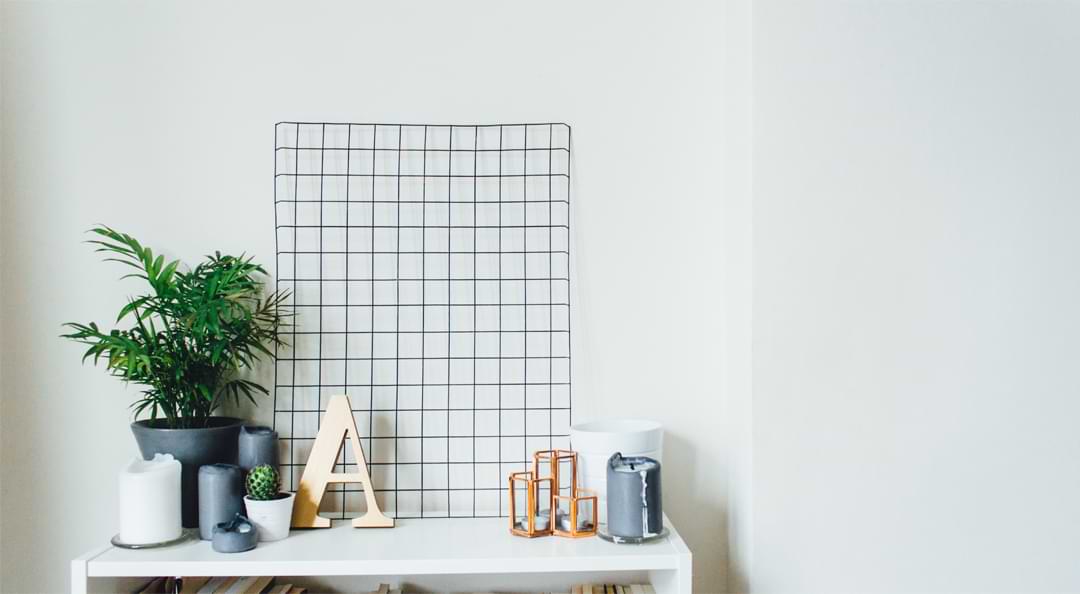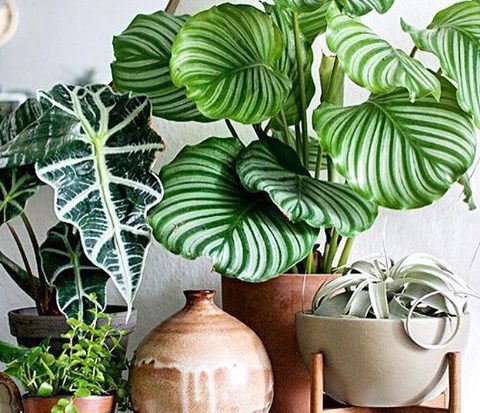Novice-Friendly Plants for the Feng Shui Flow
Being in the presence of happy, healthy plants just feels good. Whether illuminated in the midday sun or crawling across your counter, it’s undeniable: thoughtfully placed houseplants impact the energy of a room. According to the Chinese philosophy of feng shui, houseplants can also help align your home with the life you’d like to live.
What Is Feng Shui?
Feng shui is a 3,000-plus-year-old set of principles that helps strike a balance between a living space and the natural world. The basic pursuit centers around ch’i—the life force that flows through all living and inanimate beings. Maximum positive ch’i is achieved through intentionally aligning your energy with your surroundings.
In the home, feng shui achieves this through dividing a living space into energy centers called bagua. Each bagua zone symbolizes an area of your life, such as family, health, or career. The bagua map is represented by five foundational elements: water, earth, fire, metal, and wood.
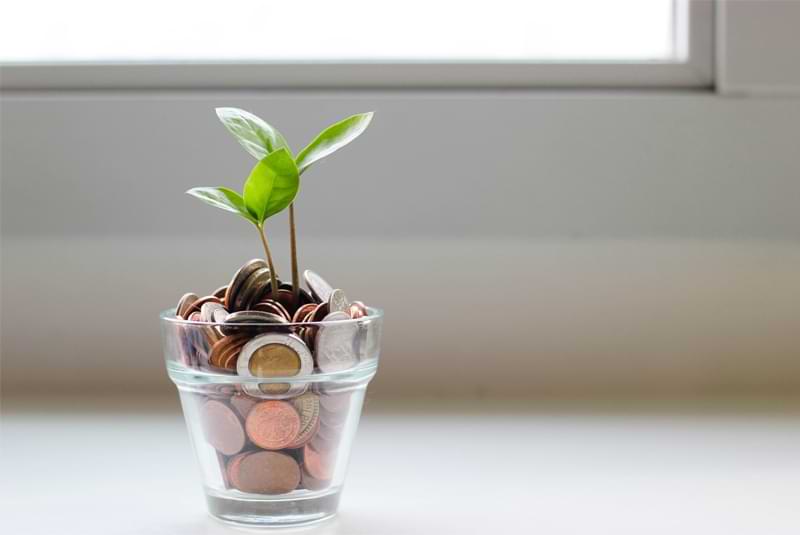
Plants and Feng Shiu
Plants strengthen the wood element in your home, which symbolizes the vital energy of growth and creativity. The deep green colors common in houseplants are also associated with healing. This is why these living ch’i tools are an essential part of exploring the world of feng shui.
What Makes a Plant Good for Feng Shui?
In general, any healthy, happy plant will improve the energy in your home. As you learn to intentionally incorporate feng shui principles, look for deep green plants with soft and rounded leaves; these plants are said to give off the most nourishing and healing energy.
What Makes a Plant Bad for Feng Shui?
Experts generally recommend against plants with “harsh” features when decorating for feng shui. These types of plants (such as cactuses) are said to trigger sha qu’i, or sharp energy. However, no matter the species, a neglected or dying plant will disrupt the energy of the space in which it is placed.
The 3 Best Feng Shui Plants for Beginners
Feng shui can get complicated quickly. Like caring for houseplants, it is a detailed practice with varying levels of complexity. But there are novice-friendly ways to begin exploring the ancient art with plants that are just as easy to care for!
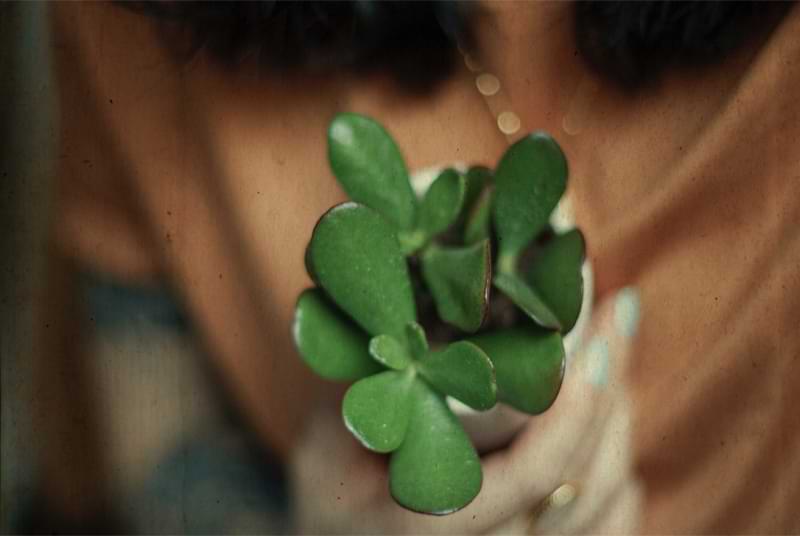
Jade Plant/Money Tree
A jade plant (also known as a money plant) is used in feng shui to attract wealth and prosperity. The succulent’s round, deep green leaves are symbolic of growth and renewal. That’s why you’ll often see this popular plant given as a housewarming or grand opening gift.
Where to Place a Jade Plant for Feng Shiu
- Entryway: Jade plants are often placed in restaurant entryways to promote financial prosperity and good luck. In your home, jade is an excellent plant for front doors and foyers.
- Home office: A jade plant placed in the southeast corner of your home office or desk is said to encourage prosperity in your work life and professional pursuits.
- East location: Place your plant in this region of the bagua map for family harmony and good health.
- Southeast location: This region of the bagua map correlates with prosperity and abundance.
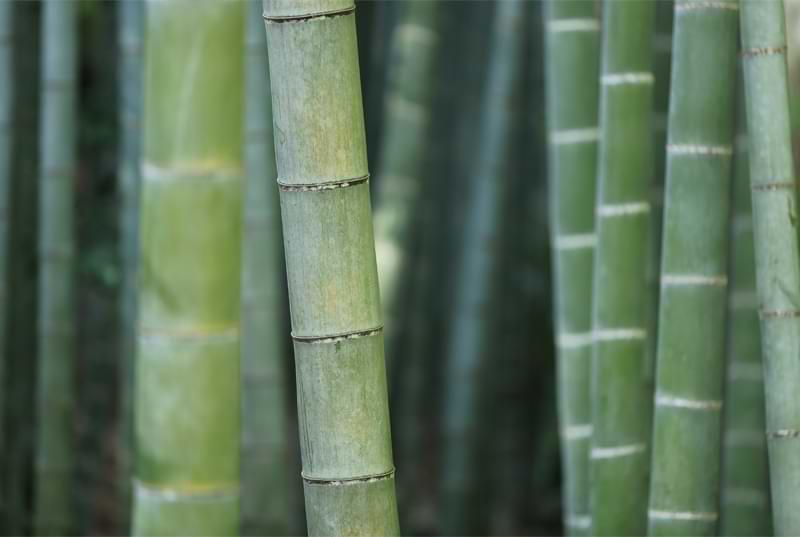
Lucky Bamboo Plants for Feng Shui
One of the most symbolic plants in feng shui, Lucky Bamboo is believed to contain a peaceful and wise energy. These plants are often used as a symbol of growth and adaptability.
Lucky Bamboo Arrangement for Feng Shui
Lucky Bamboo is generally displayed in arrangements of single or multiple stalks. These arrangements incorporate each of the five elements of feng shui.
- Wood: symbolized by the Lucky Bamboo itself
- Water: Lucky Bamboo is grown in a vase of water rather than dirt.
- Earth: symbolized by the rocks that fill the vase of water
- Metal: symbolized by a glass vase or by placing a metal coin/figurine in the arrangement
- Fire: A red ribbon is tied around the stalks of bamboo to symbolize fire.
The number of bamboo stalks in a Lucky Bamboo arrangement can create harmony in different areas of your life. Here are what a few of the most common groupings symbolize:
- Two stalks: love and marriage
- Three stalks: happiness
- Five stalks: health
- Eight stalks: wealth and abundance
- Nine stalks: good fortune
Placing Lucky Bamboo for Feng Shui
As a rule of thumb, this plant is beneficial in the east or southeast corner of the room or location in which it is placed. Consider using Lucky Bamboo as a feng shui plant for living room, dining room, or home office centerpieces. It is also beneficial in the health and family bagua regions of your home.
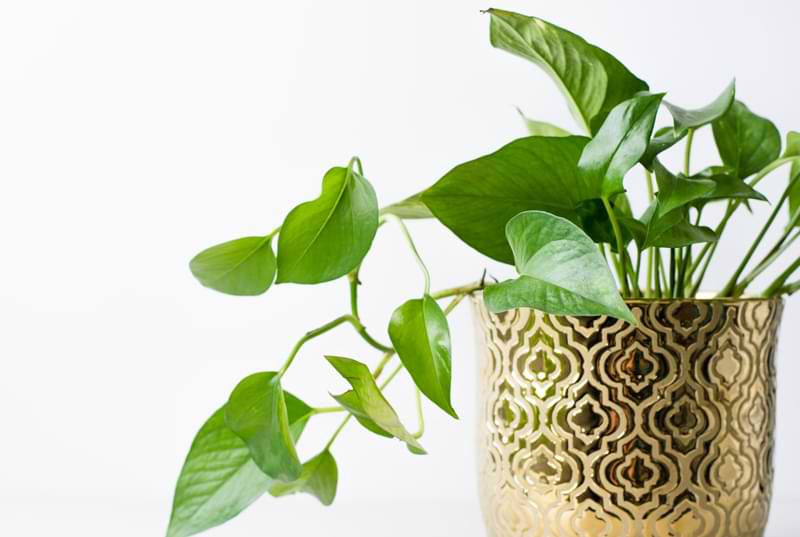
Golden Pothos Plant for Feng Shui
The easygoing Golden Pothos plant is an excellent feng shui remedy for growers of any skill level. Its lush, wandering vines and heart-shaped leaves reflect the positive energy it is believed to call into spaces. It is commonly used to balance ch’i and clear stagnant energy in the home.
Placing Golden Pothos for Feng Shui
- Dead spaces: Golden Pothos is a low-maintenance plant that can be trained to climb wherever you want it to go. This makes it an excellent remedy for “dead energy” in hard-to-reach places above cupboards and cabinets and in empty corner spaces.
- Dim spaces: Golden pothos will stay green with minimal sunlight. This makes it a great option for bringing wood energy into dim places like basement apartments and rooms with poor natural light.
- Balconies: Since Golden Pothos is a climbing vine, it is often recommended for balconies or bay windows. In this protective position, the plant acts as a barrier to incoming sha’chi, or sharp energy, from outside sources.
- Bathrooms: Lastly, Golden Pothos can help minimize negative energy in bathrooms, where the poor feng shui of doors and/or appliances cannot easily be fixed by rearranging.
Caring for Plants for Feng Shui
Selecting and placing your plant is only the first step. Healthy, happy plants are the key to positive energy in your home. Keep your plant and home thriving with our full line of plant care products.
Essentials:
- Make sure you’re giving your plants the right nutrients! Our Indoor Plant Food works perfectly for almost all indoor plants, and it’s easy to use. Grab it here!
- Use our premium well-draining potting soil for your houseplant.
- Protect your houseplant from insects, bacteria, and fungus with our Houseplant Leaf Armor. (As an added bonus, the Leaf Armor also cleans and adds shine to your houseplant’s leaves!)
- Use a moisture meter like this one to always know how thirsty your plant is.
- Click here to shop live plants!
To learn more:
- Join us for our free Top Secrets From Fiddle Leaf Fig Growers Webinar or enroll in our free Advanced Fiddle Leaf Fig Care Course.
- Read The Fiddle Leaf Fig Expert, your complete guide to growing healthy fiddle leaf fig plants. The book is available in full-color paperback or Kindle edition on Amazon now!
- Click to join our community on Facebook: Fiddle Leaf Fig Plant Resource Group.

